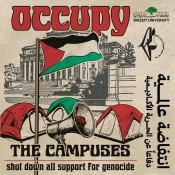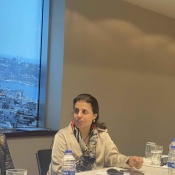Legal Encounter Explores Parliament’s Oversight Role
On December 10, 2013, the Birzeit University Institute of Law organized a legal encounter on the “Oversight Role of the PLC over the Executive Authority.” Fathi al-Wahidi, lecturer at the Gaza-based Al Azhar University spoke at the institute’s Gaza office.
Introducing the event, the institute’s Gaza Office Coordinator, Lina at-Tounisi, commented briefly about the Legal Encounters program. Designed to promote the principles of the rule of law, these public events raise awareness on select legal issues and concerns.
Professor al-Wahidi explained that real parliamentary oversight is a significant guarantee against the executive’s encroachment on other powers and precludes violation of the law. The Palestinian Legislative Council (PLC) possesses a number of oversight tools, enabling control of executive functions. These include inquiries, impeachment, reproof, and a vote of no confidence. The parliament is also authorized to approve the annual public budget and endorse agreements. Dr. al-Wahidi then described how the PLC elected in 1996 put those tools into effect.
He also reviewed problems the PLC faced when it was established, but that have continued to impair respective parliamentary functions. PLC members are not adequately familiar with common, applicable parliamentary norms and traditions. Parliamentary blocs are ineffective due to a single party control of the legislative and executive powers in the West Bank and Gaza Strip, he said. Clear constitutional norms governing the working relationship between the three powers are not in place. In addition to the geographical split between the West Bank and Gaza, legal cultures are different because of discrepant legal and constitutional systems in force in each area. PLC sessions are not held on a regular basis. Many PLC members do not pay attention to or follow up with the lawmaking process. Since their term has expired, the PLC’s legitimacy has been questioned in a nationwide debate.
Finally, Professor al-Wahidi explained that the internal Palestinian political divide has resulted in duplicate executive and judicial bodies in an unconsolidated legal framework. Three agencies now represent the Palestinian people: the PLO; the Ramallah-based Palestinian Authority, which has been recognized as a non-member state of the United Nations; and the de facto government in Gaza.
In the ensuing discussion, the audience made several recommendations. Most importantly, guests stated that oversight is an important and fundamental democratic component of liberal societies. The parliamentary system is grounded on cooperation and balance. Oversight should be reciprocated between legislative and executive bodies, positively impacting joint working relationships and ensuring a smooth constitutional life.






